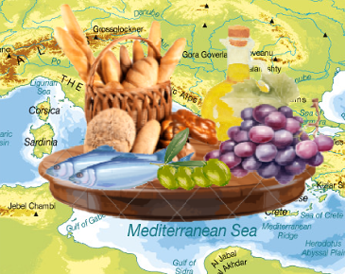What is the Mediterranean Diet? A Complete Guide to Benefits & Foods
The Mediterranean diet is one of the world’s most researched and recommended eating patterns for heart health, weight management, and longevity.
It originates from the traditional cuisines of Greece, Crete, and Southern Italy, and gained recognition when researchers noticed that people in Mediterranean regions had much lower rates of heart disease than those in Northern Europe.

Origins of the Mediterranean Diet
The concept was first popularized by Elizabeth David’s A Book of Mediterranean Food (1950). Over time, nutrition experts, dieticians, and health researchers studied the diet’s positive impact on health. Today, the Mediterranean diet is recognized as one of the healthiest diets in the world, emphasizing plant-based foods, healthy fats, and balanced meals.
At the heart of the “traditional Mediterranean cuisine” lies a traditional “trinity” of ingredients:
-
olive oil as a source of healthy fats,
-
wheat in the form of whole grains, bread, and pasta, and
-
grapes, which provide wine and powerful antioxidants.
Key Features of the Mediterranean Diet
The traditional Mediterranean diet is built around fresh, seasonal, and minimally processed foods:
-
✅ Fruits and vegetables – eaten daily in abundance
-
✅ Whole grains, legumes, and nuts – staples for plant-based protein and fiber
-
✅ Olive oil – the principal source of healthy fat
-
✅ Fish and poultry – eaten a few times per week
-
✅ Red meat – limited to occasional consumption
-
✅ Fresh fruit for dessert – sweets eaten only occasionally
-
✅ Wine in moderation – usually enjoyed with meals
Beyond food, the Mediterranean lifestyle values family meals, social connection, and regular physical activity, all contributing to better well-being.
Health Benefits of the Mediterranean Diet
Research consistently shows that following a Mediterranean eating pattern can:
-
Reduce cardiovascular risk and lower the chance of heart attack and stroke
-
Lower the risk of atrial fibrillation and peripheral artery disease
-
Control blood sugar levels and prevent type 2 diabetes
-
Slow brain aging and protect against cognitive decline
-
Improve mood and help ease depression
This makes the Mediterranean diet not just a way of eating, but a proven approach to long-term health.
How to Incorporate Mediterranean Foods into Your Diet
Here are practical steps to add Mediterranean diet foods to your meals:
-
Switch to extra virgin olive oil instead of butter or refined oils.
-
Snack on nuts and olives instead of processed foods.
-
Choose whole-grain bread, barley, bulgur, or couscous over refined grains.
-
Begin or end meals with a fresh salad of seasonal vegetables.
-
Include legumes (lentils, beans, chickpeas) at least three times a week.
-
Eat fish and poultry more often than red meat.
-
Drink wine in moderation with meals (if appropriate).
-
Replace sugary drinks with water and limit high-sugar desserts.
-
Shop for locally grown, seasonal produce whenever possible.
The Green Mediterranean Diet
A newer variation, the Green Mediterranean Diet, emphasizes even more plant-based foods such as green tea, duckweed, and leafy greens, while further reducing red and processed meats.
Bottomline
Over time, modernization and lifestyle changes have altered traditional Mediterranean eating habits, with rising wealth leading to more meat and processed food consumption and less emphasis on plant-based meals.
Still, the Mediterranean diet remains a sustainable lifestyle built on fresh, wholesome, and flavorful foods. By choosing olive oil, whole grains, vegetables, legumes, nuts, and fish, and combining them with social meals and regular activity, you can greatly enhance your health and longevity.
Medical Disclaimer.
Read further on:
≺≺ What Is the Ketogenic Diet? Is the Keto Diet Right for Everyone?
≺≺ Why should I combine Avocados and Tomatoes?
≺≺ Cholesterol: What Does Diet Have to Do with It?
≺≺ Which food is most associated with helping people live longer?
≺≺ Is Plant-Based Protein the Key to a Longer, Stronger Life?
≺≺ How important is fiber in the diet?
≺≺ What cardiovascular benefits do berries provide?
≺≺ What is the Okinawan diet? What is the secret behind Okinawan long life-expectancy?
≺≺ Ultra-Processed Foods: What They Are, Why They’re Harmful, and How to Cut Back.
≺≺ What grains have the lowest glycemic index?
≺≺ How Important Is Protein for Your Health?
≺≺ is your kid getting too much protein?
≺≺ What foods and vitamins are good for your skin?
≺≺ EWG’s- The Clean Fifteen: Fruits and Vegetables with the Lowest Pesticide Levels.
≺≺ What eating strategies work best for losing weight long term?
≺≺ How Do Sugary Meals and Beverages Harm Dental Health?
≺≺ Why Vitamin B12 Is Important for Your Health?
≺≺ What foods should people with high blood pressure avoid?
≺≺ What food is most effective for moderating blood sugar?
≺≺ What are antioxidants? How antioxidants in the fruits and vegetables help in preventing cancers and diseases?
≺≺ How can I reduce the risk of cancer-causing chemicals when cooking or grilling meat?
≺≺ What happens to my blood vessels when I gain weight?
≻≻-Back to Home page.
Further reading (External Links opens in new window):
≺≺- The New England Journal of Medicine – Association of Nut Consumption with Total and Cause-Specific Mortality.
≺≺- Harvard Health Publishing – Eating peanuts may extend your life.

